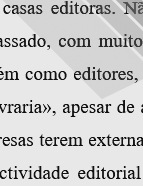

................................
Until the beginning of the 19th century, it competed with private printers, financing itself largely through the exclusive manufacture of playing cards. After the Liberal Wars, it underwent a period of modernisation, during which the import of technology (such as mechanical casting and steam printing), for example, was promoted. This renewal movement, which placed it more on a par with its European counterparts, came to an end in the final years of the century due to the crisis. However, the establishment of the Republic strengthened its cultural role. On the other hand, despite incorporating material from other state printing houses in the Imprensa Nacional, the Estado Novo prevented the latter from continuing its usual publishing activity, limiting it solely to production that could not be carried out by private companies, due to its characteristics. There were also the publications of the Biblioteca Nacional [National Library], the Academia das Ciências [Academy of Sciences], the Academia Portuguesa da História [Portuguese Academy of History] and the Academia Nacional de Belas-Artes [National Academy of Fine Arts]. It was not until after the Second World War that there was greater investment in the company - which, in fact, only became a major publishing agency from the 70s onwards. In 1972, it merged with the Casa da Moeda [National Mint] to create the current Imprensa Nacional-Casa da Moeda (M. I. Queiroz et al., 250 Anos [250 years]…, 2020).
In view of the above, it is easy to see how the work undertaken by the Imprensa Nacional in the specific field of history was vast, especially in the case of more extensive works. Some of the larger works are worthy of mention, such as: the Dicionário Bibliográfico Português [Portuguese Bibliographical Dictionary] (1858-1923, 22 volumes), by Inocêncio Francisco da Silva, Brito Aranha, among others; the História de Portugal dos Séculos XVII e XVIII [History of Portugal in the 17th and 18th centuries] (1860-1871, five volumes), by L. A. Rebelo da Silva; the História da Guerra Civil e do Estabelecimento do Governo Parlamentar em Portugal [ History of the Civil War and the Establishment of a Parliamentary Government in Portugal] (1866-1890, 19 volumes), by Luz Soriano; the Obras Completas do Cardeal Saraiva [Complete Works of Cardinal Saraiva] (1872-1883, ten volumes); the História da Administração Pública em Portugal nos Séculos XII a XV [ History of Public Administration in Portugal from the 12th to 15th century] (1885-1922, ten volumes), by Gama Barros; the História Orgânica e Política do Exército Português [Organic and Political History of the Portuguese Army] (1902-1932, 17 volumes), by Cristóvão Aires de Magalhães Sepúlveda (in conjunction with the University Press). Additionally, Cunha Ravara, Vicente d'Almeida Eça and Latino Coelho may be referred to as some of the most noteworthy names that also appeared in the Imprensa Nacional catalogues.
